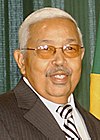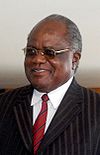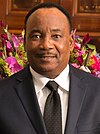Ibrahim Prize
| The Ibrahim Prize | |
|---|---|
| Awarded for | excellence in African leadership |
| Sponsored by | Mo Ibrahim Foundation |
| Presented by | an independent Prize Committee |
| Reward(s) | $5 million |
| First awarded | 2007 |
| Last awarded | 2020 |
| Website | moibrahimfoundation.org |
The Ibrahim Prize for Achievement in African Leadership is an annual prize awarded to a former African executive head of state or government on criteria of good governance, democratic election and respect of terms limits. On eight of the fourteen years it has been offered, no leader has been found worthy of the award.[1]
Background[]
Established by the Mo Ibrahim Foundation in 2007, the Ibrahim Prize celebrates excellence in African leadership. It is awarded to a former Executive Head of State or Government by an independent Prize Committee composed of eminent figures, including two Nobel Laureates.
The Ibrahim Prize
- recognises and celebrates African leaders who have developed their countries, lifted people out of poverty and paved the way for sustainable and equitable prosperity
- highlights exceptional role models for the continent
- ensures that Africa continues to benefit from the experience and expertise of exceptional leaders when they leave national office, by enabling them to continue in other public roles on the continent
Criteria
- former African Executive Head of State or Government
- left office in the last three years
- democratically elected
- served his/her constitutionally mandated term
- demonstrated exceptional leadership
With a US$5 million payment, the prize is believed to be the world's largest, exceeding the $1.3m Nobel Peace Prize. Former South African President Nelson Mandela, former United States President Bill Clinton, and former United Nations Secretary-General Kofi Annan are among those who have welcomed the initiative.[2]
The Ibrahim Prize for Achievement in African Leadership has been awarded in 2007, 2008, 2011, 2014 and 2017. Former South African president Nelson Mandela was an honorary laureate.
Prize Committee[]
- Salim Ahmed Salim (Chair), former Secretary General of the Organisation of African Unity.
- Martti Ahtisaari
- Aicha Bah Diallo
- Mohamed ElBaradei
- Horst Köhler
- Graça Machel
- Festus Mogae
- Mary Robinson
Laureates[]
| Year | Laureate[3] | Country | Rationale | |
|---|---|---|---|---|
| 2007 | 
|
Joaquim Chissano | for "his role in leading Mozambique from conflict to peace and democracy."[4] | |

|
Nelson Mandela (honorary)[5] | |||
| 2008 | 
|
Festus Mogae[6] | "President Mogae's outstanding leadership has ensured Botswana’s continued stability and prosperity in the face of an HIV/AIDS pandemic which threatened the future of his country and people." | |
| 2009 | No award given[7] | |||
| 2010 | No award given[8] | |||
| 2011 | 
|
Pedro Pires[9] | President Pires was awarded the 2011 Ibrahim Prize for his role in transforming Cape Verde into a model of democracy, stability and increased prosperity.[10] | |
| 2012 | No award given[11] | |||
| 2013 | No award given[12] | |||
| 2014 | 
|
Hifikepunye Pohamba[13] | "During the decade of Hifikepunye Pohamba’s Presidency, Namibia’s reputation has been cemented as a well-governed, stable and inclusive democracy with strong media freedom and respect for human rights." | |
| 2015 | No award given[14] | |||
| 2016 | No award given[15] | |||
| 2017 | 
|
Ellen Johnson Sirleaf[16] | "In very difficult circumstances, she helped guide her nation towards a peaceful and democratic future, paving the way for her successor to follow." | |
| 2018 | No award given[1] | |||
| 2019 | No award given[17] | |||
| 2020 | 
|
Mahamadou Issoufou[18] | For his efforts to economic development of his country while working for regional stability, as well as his engagement to limit himself to two terms, leading to the first ever democratic transition of power in Niger. | |
See also[]
References[]
- ^ a b Flanagan, Jane (2019-08-06). "African leaders fail $5m test yet again". The Times. ISSN 0140-0460. Retrieved 2019-08-15.
- ^ "Prize offered to Africa's leaders". BBC. 26 October 2006. Retrieved 2008-10-21.
- ^ "Mo Ibrahim Foundation - Laureates". Mo Ibrahim Foundation. Retrieved 21 November 2015.
- ^ "Mozambique ex-leader wins prize". BBC News. 22 October 2007. Retrieved 2008-10-21.
- ^ Tutton, Mark (14 October 2013). "Mo Ibrahim prize for African leaders: No winner ... again". CNN. Retrieved 28 July 2015.
- ^ "Festus Mogae wins Ibrahim Prize". BBC News. 20 October 2008. Retrieved 2008-10-21.
- ^ "No award". 19 October 2009. Archived from the original on 27 October 2009. Retrieved 2009-10-19.
- ^ "No award". 19 October 2009. Archived from the original on 27 October 2009. Retrieved 2009-10-19.
- ^ "Cape Verde ex-leader Pedro Pires wins Mo Ibrahim prize". BBC News. 10 October 2011. Retrieved 2011-10-10.
- ^ "The Ibrahim Prize for Achievement in African Leadership". Mo Ibrahim Foundation. Archived from the original on 2015-02-06. Retrieved 2014-12-19.
- ^ McGregor, Sarah (15 October 2012). "Mo Ibrahim Foundation Picks No Winner for African Leader Award". Bloomberg News.
- ^ "Mo Ibrahim African leaders prize unclaimed again". BBC News. 14 October 2013. Retrieved 2013-10-14.
- ^ "Announcement". Mo Ibrahim Foundation. 2 March 2015. Retrieved 2 March 2015.
- ^ "Mo Ibrahim Foundation announces no winner of 2015 Ibrahim Prize for Achievement". 20 June 2016. Retrieved 2016-12-02.
- ^ "Mo Ibrahim Foundation announces no winner of 2016 Ibrahim Prize for Achievement". 28 February 2017.
- ^ "Announcement". Mo Ibrahim Foundation. 12 February 2018. Retrieved 12 February 2018.
- ^ "Ex-Botswana leader appointed chair of Ibrahim Prize committee". apanews.net. Retrieved 26 February 2020.
- ^ https://www.rfi.fr/fr/afrique/20210307-le-prix-mo-ibrahim-attribu%C3%A9-au-pr%C3%A9sident-nig%C3%A9rien-mahamadou-issoufou Le prix Mo Ibrahim attribué au président nigérien Mahamadou Issoufou
External links[]
- Official website
- The Dictator Index by Ken Auletta
- Mike Jakeman, "Rewarding the Rich", The Oxonian Review
- Governance and civic leadership awards
- Awards established in 2007